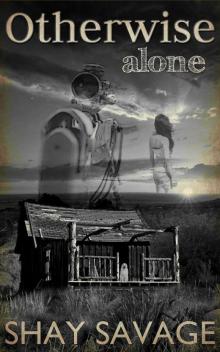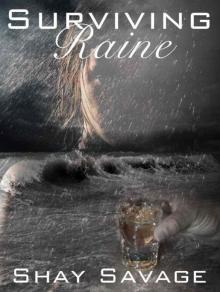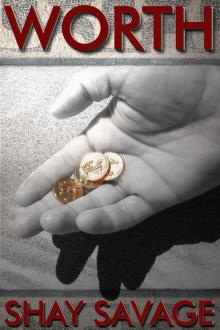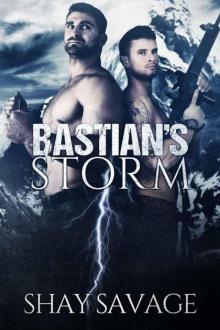- Home
- Shay Savage
Outnumbered
Outnumbered Read online
OUTNUMBERED
Shay Savage
Copyright © 2018 Shay Savage
All Rights Reserved
Editing: Chayasara
All rights reserved. No part of this book may be reproduced in any form or by any electronic or mechanical means including information storage and retrieval systems without the express permission of the author, Shay Savage —except in the case of brief excerpts or quotations embodied in review or critical writings.
The characters and events in this book are fictitious or are used fictitiously. Any similarity to real persons, living or dead, is purely coincidental and not intended by the author.
Cover art by Jada D'Lee Designs
Table of Contents
Prologue
Chapter 1
Chapter 2
Chapter 3
Chapter 4
Chapter 5
Chapter 6
Chapter 7
Chapter 8
Chapter 9
Chapter 10
Chapter 11
Chapter 12
Chapter 13
Chapter 14
Chapter 15
Chapter 16
Chapter 17
Chapter 18
Chapter 19
Chapter 20
Chapter 21
Chapter 22
Chapter 23
Chapter 24
Chapter 25
Chapter 26
Chapter 27
Chapter 28
Chapter 29
Chapter 30
Chapter 31
Chapter 32
Epilogue
More Books by Shay Savage
Kindle Unlimited—Read for Free!
About the Author
Prologue
Focus.
My hands are shaking. I’m not sure if it’s from the cold or the pain. I dare to look down at my right leg, but I can’t see anything except blood through the tear in my thick, insulated pants. I’m certain a chunk of wood is embedded in the muscle. I shift my leg slightly as pain shoots from my ankle to my hip.
That doesn’t matter.
Bile invades the back of my throat as images of my mother flash through my throbbing head. I can’t pay any attention to the pain—not now. I have to focus. I have to get up. I can’t let him get to her.
She’s going to die.
I grit my teeth and push again.
Chapter 1
Blinding, bright white.
Through the small window of the cabin, I fill my eyes with the bright, snow-covered landscape, but my head is full of images from the past.
“You had a chance to speak before the sentencing, but you said nothing.”
I stared at my court-appointed attorney but didn’t respond.
“You understand what this means, don’t you, Bishop? You’re going away for a long time. If you had said anything at all, it may have gone better for you.”
“I doubt it.” I tried to cross my arms, but the handcuffs brought me up short. I placed my fists on the top of the table instead and stared at the metal around my wrists.
“Do you feel any remorse at all for what you’ve done?”
“Not really.”
He sighed and closed his briefcase. He had done his job as well as he could, given the circumstances.
I push the thoughts away and turn from the window. I no longer bother questioning myself about why these thoughts invade my head this time of year—I already know the answer. I’ve spent enough time psychoanalyzing myself to realize that winter brings isolation, and all the time I spent in solitary is at the forefront of my mind. Nonetheless, this isolation is self-induced, and the memories and the impending loneliness come anyway.
Technically, it was all self-induced. It’s not like I was innocent.
Pausing for a moment, I look around the small cabin that has been my home for some time now. The fireplace along the north wall is the predominant feature, followed by a full-size bed with a wooden headboard, a small dresser, and a plush reclining chair. A kitchen area on the east wall and a small door leading to a bathroom and closet are the only other features of note. There is no electricity, and the well that feeds the kitchen and bathroom only provides cold water. I consider myself lucky to have found a place with running water and enough serviceable land to add a septic tank. Many of the inhabitants of Canada’s Northwest Territories don’t have as much.
Calling the cabin sparse would be an understatement, but I don’t need much of anything else. A rug on the solid wood floor adds a little comfort, and the fireplace serves as a source of life-sustaining heat through the seasons.
I need to finish my winter shopping list, so I pick up the stubby pencil off the table and jot down a few more items.
Kerosene
Cooking oil
Paper towels
I toss the pencil on top of the notepad and walk over to the kitchen area of the small cabin. I open cabinets and take note of what’s inside and what key items are missing. I don’t need a lot—most of my necessities are provided for by the land around me. I add sugar to my list before heading to the bathroom and checking under the sink. I’m low on several first aid supplies, so I add them to my list as well.
Just one more stop before I journey across the ice road to the closest city. There’s been some talk over the past year about funding for an all-seasons road in the area. The government plans to chip in, and the local community and the mining companies digging around for cobalt will get a lot of benefits, but I chose this area because of the isolation. A road up here just means someone might find me.
Though winter is officially a few days away, it’s already bitterly cold outside. I slide into my boots, bundle up, and head outside. The brisk wind slaps me in the face and sends a shiver down my spine. I pull my sleeves a little farther down to cover the gap between my wrists and my gloves before I trek out across the snow.
My boots crunch against the powder, leaving dark prints on the dirt below. Within a couple of weeks, the snow will be deep enough that stepping on it won’t reach the earth underneath. A few weeks after that, I’ll need snowshoes to get around outside.
The crunching sound reminds me of bones breaking. In my head, I hear myself scream right before the first crunch. After that, each crunch had been followed only by my own rough breathing. Then silence.
“9-1-1, what is your emergency?”
“There’s, uh…there’s a dead body here.”
“Excuse me, sir. Did you say ‘a dead body’?”
“Yeah.”
“What is your location?”
I turn my face into the wind, forcing myself to focus on the chill instead of my thoughts.
Two hundred feet away from the cabin is a group of Jack Pines and Tamaracks—a bright line of green in front of a standing rock formation of grey and white. To the west grow aspens and larch, which work better for fires and lumber. An outbuilding sits right in front of the tree line. It’s not quite big enough to be considered a barn, but that’s what I call it in my head. It’s a two-part structure of logs on one half and stone on the other. The wooden part of the barn is falling apart, but nothing inside is fragile, so I haven’t bothered to repair the partially collapsed roof or the gaping hole in the back corner. Inside is still protected from the wind. The stone portion is better protected from critters and is where most of my food is stored for the winter.
Much of the barn is full of firewood covered with a large tarp. It’s not quite enough to get me through the winter, and I’ll spend the next few days chopping more. Along one wall of the barn sits a line of metal crates holding most of my extended survival gear. I open the first one, count the candles and bundles of tinder inside, and then move on to the next one. Water purification tablets are low, so I�
�ll need to add those to my list. I need more rock salt, too.
A high-pitched squeal startles me. I stand motionless for a few seconds as I try to determine from which direction the sound came. A moment later, I hear it again. I take a few steps toward the back of the barn and look behind the smaller of the two woodpiles. The edge of the tarp lies on the ground with a couple of rotten logs nearby. In the midst of bark and sawdust is a tiny kitten.
The grey bundle of matted fur moves just enough to look up at me. Its feet are pulled up underneath it, and it seems to be having trouble lifting its head as it looks up at me.
“How the hell did you get here?” I ask.
It mews in response, staring at me with wide, bright green eyes. I don’t know much about cats, but I’m pretty sure this one can’t be more than a few weeks old.
I see tiny prints at the back of the barn, coming in from the hole near the floor. There’s only one set of tracks, so the little thing is apparently alone.
“Surprised you’re alive at all,” I mutter. I shake my head and finish going through the crates, determined to ignore the invader. When I’m nearly done, it stumbles out from behind the woodpile and drags itself over to my foot. It mews again, then follows me around as I take inventory, crying and trying to scratch my foot through my boot. It follows me outside when I’m done, flattening its ears against the wind and crying louder as it hunkers down against the door.
“You’ll last longer if you stay in there,” I tell it. “Where’s your mother? You’re too young to be on your own.”
I walk around the back of the barn and follow the tracks to the edge of the woods, but there’s no sign of any other felines around. I can only assume the mother cat never made it back from a hunt, and the kitten eventually ventured out to find her.
I go back to the front of the barn, and it meows loudly at me.
“No siblings?”
The kitten takes a step inside the barn and looks back. The wind is blowing dusty snow around the ground, and its whiskers are covered in snowflakes.
“I’m done in there,” I say, shaking my head. “You’re going to be food for a fox before long, so you might as well head for the woods and get it over with.”
With that sentiment, I begin to make my way back to the cabin. I try not to glance back, but I can hear the thing crying as it tries to follow me through the snow. I know it’s too young to survive without its mother, and I don’t want to prolong the inevitable. My chest tightens a bit at the thought, but I quicken my pace to the cabin porch.
As I kick snow off my boots, the kitten arrives at the single step to the cabin door but is far too small and weak to actually climb up. It falls a few times before giving up, then sits in the snow to cry some more.
I grab the handle of the door, fully prepared to go inside and shut it behind me. I don’t know why I stop and look at the pitiful thing. It’s probably diseased or carrying parasites. Unless I run out of mousetraps, I have no use for such a thing in my cabin. It’s not even cute—it’s mangy, scrawny, and sad.
“I’m not an animal lover.”
Again, it places its front paws on the edge of the step and tries to pull itself up. It nearly succeeds this time, which makes its fall into the snow that much more exaggerated when it fails. Its feet fly up into the air as it falls on its back and rolls a bit before righting itself and whining.
With a sigh, I reach down and pick the kitten up. It’s so small, I can barely feel its weight in my hand as I grumble to myself and go inside.
“I don’t want a cat.”
I deposit the thing on the rug near the fireplace. It sways unsteadily for a moment and then looks around the room, sniffing the air.
“I suppose you’re hungry.” I have no idea what to feed a kitten. I don’t have any milk. I could get some on my supply run, but the scrawny thing might actually die of starvation before then. Maybe that would be for the best.
As I remove my outer clothing, I debate tossing it back out into the snow. I have no need for a pet, and this one is likely sickly and going to die soon. If I keep it inside, it’s just going to stink up the place when it does expire, and then I’ll have to dig into the frozen ground to bury it.
Instead, I find a bouillon cube in the cabinet and mix it in a cup with a bit of water I warm over the fire until it’s a thick, brown liquid. In the bathroom, I find an old bottle of saline eye drops and remove the cap with the built-in dropper. I clean it out as much as I can and then fill it with the meaty broth.
Sitting cross-legged on the floor, I grab the mangy kitten and flip it onto its back. I place the dropper into its mouth, and after a few tries, it begins to suck.
As the kitten eats, I check it over for fleas or any other kind of vermin. I don’t find any—probably too cold for such things already. The only thing I find is a tiny penis near his tail.
“I guess you’re a boy.”
The dropper doesn’t hold much liquid, and the kitten is ravenous. I have to keep stopping to refill, which seems to piss him off no end. He howls every time the dropper goes dry, then howls louder when I take it away to get more.
The kitten’s tiny stomach only manages to hold about half of the cup of broth. Once he’s had his fill, I place the kitten back on the rug and wash the dropper out in the cold water at the basin as the kitten ventures a little closer to the warmth of the fire.
“I suppose you’re going to need a place to pee and shit.” I grumble as I head into the bathroom and open the closet door inside.
I find an old metal baking pan and fill it with sawdust from the barn and place it next to the toilet. The kitten climbs inside of it as soon as I put it on the floor, walks around in a circle a couple of times, and then does his business.
“Well, at least you got that figured out.”
I head back to the main living area and sit down in the room’s single chair. I take out my list to give it one last look.
“Ow!” The little thing digs his claws into my jeans, using all of his newfound energy to hoist himself up my pant leg and into my lap. He steps back and forth on my thigh, turns around in a circle, and then curls up with his nose tucked under his tail.
I want to be pissed off at him. I want him not to be here at all. I’ve never had a pet or a desire to acquire one, and that hasn’t changed. I’m not suited to care for anyone other than myself, and that goes for cats, too. My life is all about practicality, and there is no practical reason to keep this thing.
My leg vibrates as he begins to purr.
Chapter 2
The ninety-mile trek across the ice road to Yellowknife is slow and uneventful. The city is the capital of the Northwest Territories and the only place where I can outfit myself to survive the winter alone. It’s the only real city for hundreds of miles, complete with tourism and a Wal-Mart. I try to stay away from tourist areas even this late in the season, but sometimes it can’t be helped. Still, it makes my skin crawl to be around a lot of people.
Too many years locked away in close quarters with the other murderers, thieves, dealers, and all-around criminals took its toll on my ability to socialize with “normal” society, not that my childhood was normal. Fuck, I sure hope my upbringing wasn’t the norm though it would explain why people are so shitty to each other.
I complete most of my shopping at Co-op and then head to the Yellowknife Book Cellar. It’s quiet inside—far too cold now for the tourists to be looking for a summer read—and I’m grateful for it. I browse for an hour before I pick out six books ranging from popular fiction to a non-fiction title about the Underground Railroad. I don’t read a lot during the winter months, but it’s less frustrating than trying to get the radio to pick up a signal.
I check my list against the items in the back of the Jeep, trying to figure out why I have a niggling feeling in the back of my head that I’ve forgotten something. I’ve already checked three times, but I’ve been paranoid about forgetting something important ever since I neglected to buy black pepper two years ago
. Though it only impacted the seasoning of my food, it had me worried that I would forget something needed for survival.
Sometimes, paranoia is a good thing.
I climb back into the Jeep and let it run for a minute to warm up, then head back to the Yellowknife Highway. Hopefully, whatever I have forgotten can be found in Whatì, my last stop.
I get off the highway near Edzo and head off-road, following the edge of the lake for a few miles until I get to the top. I turn the Jeep east over rocky terrain for about three miles until I hit a dried-up riverbed. In a few weeks, it will be an ice-road and traveled only by the very brave. I follow the bed until I get to a dirt road. I use the road for a few more miles until I get to its northernmost point. If I were to turn right and drive east, I would come to a small lake, veer left and off the road again to my cabin near the rocks. Instead, I turn west and head toward Whatì in the Tłįchǫ Lands—the nearest settlement to my cabin.
Whatì is a hunting and fishing village set on the edge of Lac La Martre, one of the largest lakes in the territory. With just under five hundred residents, mostly Dene people, Whatì is a self-governed community with a chief and a council. I can’t speak their language—I can’t even properly pronounce the name of the settlement or the region—but the people seem to have accepted me in the area anyway.
Thanks to Margot.
The Tłįchǫ Lands are a great place for all kinds of fishing and hunting. Caribou are plentiful as are black bears and wolves. The lake near Whatì has the best trout and pike fishing around, and the settlement has been pushing the summer tourist trade. Despite the drought in recent years, trees are still in abundance, and I can find plenty of fuel for heating and cooking. If I’m desperate for some commodity during the winter months, and the Jeep won’t run or runs out of fuel, I can make it to Whatì in less than a day on foot. When I first traveled to the area, I stayed there and learned how to hunt, fish, and track game. I still occasionally make contact with the people who taught me.
Glancing down the road, I briefly consider heading into the small fishing village. I could go down to the docks and buy some fish to supplement the rest of my winter stores. Margot would almost certainly be there, and she’d give me that look she gives when she thinks she knows what I want. She’d assume I’d come to see her, and she wouldn’t be completely wrong. Ultimately, it isn’t fair to lead her on. She knows I’m not going to change my mind and come back to live in Whatì.

 The Apprehension
The Apprehension Trapped
Trapped Takedown Teague
Takedown Teague Outnumbered
Outnumbered The Consummation
The Consummation Kandace and the Beast
Kandace and the Beast Savaged
Savaged Transcendence
Transcendence Otherwise Alone
Otherwise Alone Isolated
Isolated Commodity
Commodity Surviving Raine
Surviving Raine Talen
Talen Released
Released Specimen
Specimen One Night in a Dungeon
One Night in a Dungeon One Night in a Dungeon: Savage Kinksters Book 2
One Night in a Dungeon: Savage Kinksters Book 2 Otherwise Unharmed
Otherwise Unharmed Deklan
Deklan Worth
Worth Luffs: Transcendence Novella
Luffs: Transcendence Novella The Seduction
The Seduction Irrevocable
Irrevocable Uncockblockable
Uncockblockable Alarm
Alarm One Night in a Storm: Savage Kinksters Book 1
One Night in a Storm: Savage Kinksters Book 1 Judging Books
Judging Books Unexpected Circumstances - the Complete Series
Unexpected Circumstances - the Complete Series Win Some, Lose Some
Win Some, Lose Some Bastian's Storm
Bastian's Storm Luffs
Luffs Unexpected Circumstances: The Handmaid
Unexpected Circumstances: The Handmaid The Consummation (Unexpected Circumstances #3)
The Consummation (Unexpected Circumstances #3) The Devastation: Unexpected Circumstances Book 7
The Devastation: Unexpected Circumstances Book 7 Takedown Teague (Caged #1)
Takedown Teague (Caged #1) Birthright
Birthright The Shortcoming (Unexpected Circumstances #4)
The Shortcoming (Unexpected Circumstances #4) The Seduction (Unexpected Circumstances #2)
The Seduction (Unexpected Circumstances #2) The Concubine (Unexpected Circumstances #5)
The Concubine (Unexpected Circumstances #5) The Apprehension: Unexpected Circumstances Book 6
The Apprehension: Unexpected Circumstances Book 6 Irrevocable (Evan Arden #5)
Irrevocable (Evan Arden #5) Otherwise Unharmed (Evan Arden Trilogy) (Volume 3)
Otherwise Unharmed (Evan Arden Trilogy) (Volume 3)